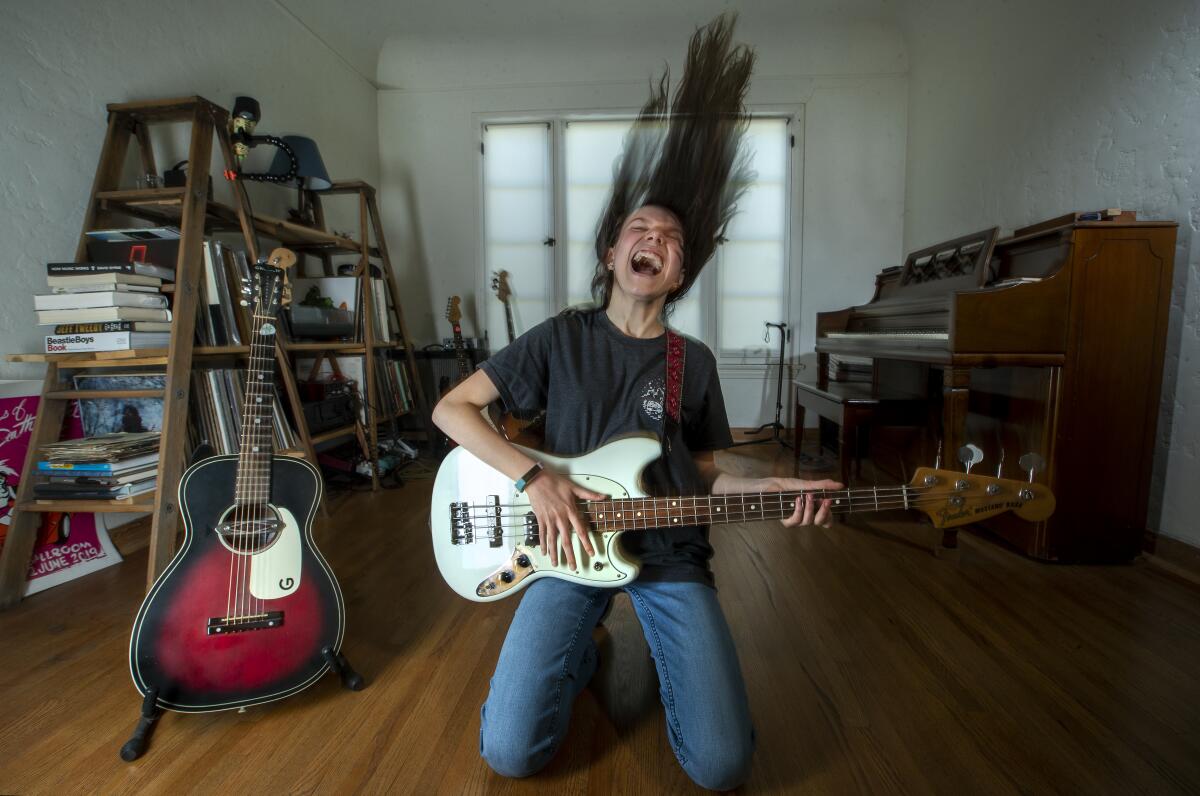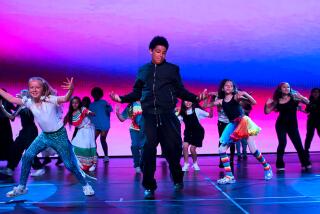For young shredders at School of Rock, it’s finally time to melt faces again

- Share via
In the 2003 musical comedy “School of Rock,” Jack Black plays a wayward rock guitarist who takes a gig as a substitute teacher — and trains a class of brainy fifth-graders to play rock instruments, and eventually, compete in a local battle of the bands. By the movie’s end, the kids go home not with the grand prize, but with a profound sense of purpose and belonging.
Founded in 1998 by Philadelphia musician and philanthropist Paul Green, the real-life School of Rock is not your standard after-school music class: It’s a year-round program dedicated to teaching music through both classic and contemporary rock songs, which students ages 8 to 18 first learn to perform privately, then together in bands. Ultimately, each band is thrust into the limelight, ready to shred their favorite Beatles, Nirvana or Bikini Kill song before a live audience.
For the record:
10:55 a.m. April 21, 2021An earlier version of the story stated that the children in the movie, “School of Rock,” won the Battle of the Bands. They did not win the battle, but they did perform a cover of AC/DC’s “It’s a Long Way to the Top (If You Wanna Rock ‘n’ Roll)” for an encore.
Despite a gradual decline in guitar sales, and the waning presence of rock on the Billboard charts, the School of Rock and its dynamic, hands-on method have grown more popular among school-age children over the years. In the past decade, it has expanded into a global network of 260 music programs across nine countries, counting seven locations in the Los Angeles area. Such locations have organized showcases in conjunction with major labels like Atlantic Records and Universal Music Group, where students vie for a shot at a record deal; some graduates have gone on to appear on shows like “American Idol,” “The Voice” and even “School of Rock: The Musical.”
By the beginning of 2020, School of Rock’s attendance was at an all-time high. Then COVID-19 turned down the volume.
“We were bursting at the seams, having serious conversations about if we had enough rooms and capacity for the next five years,” says Justin Salmons, general manager at the West L.A. School of Rock. “Then the pandemic hit, and [West L.A.] went from a total student count of 230 students and rapidly growing, to 129 today.”
Spotify dominates music streaming but its payment rate to artists continues to generate controversy. Will recent musician-led protests bring about change?
With an education model contingent on live performance, the School of Rock had to modify its method, and quickly. By March 2020, the School of Rock network pivoted entirely to remote instruction, offering the newly patented Method App to record and mix tracks, as well as live-stream events with visiting music professionals, including superstars Stevie Wonder and the Rolling Stones.
Even when done remotely, the School of Rock is a considerable step up from learning guitar from YouTube, which is what many adults took up to combat the 2020 quarantine blues. (And hey, they did fuel a boom in guitar sales.) And yet Zoom fatigue is real, says Salmons. “Kids are stressed out and isolated from each other — even my teenagers want breaks from their screens.” A recent poll of students in the program and their families revealed more than two-thirds of respondents wished to return to in-person classes.
And so, despite the fact that children under 16 remain ineligible for the COVID-19 vaccine, beginning May 1, the School of Rock will allow L.A. students to attend class either in person or online. With vaccination levels among adults on the rise, and new cases of COVID-19 falling, this is in keeping with the Los Angeles Unified School District reopening its schools this month.
“I got frustrated with the computer because sometimes [teachers] couldn’t hear me,” says 9-year-old drum student Chloe Ingram, who, come May, will return to class at the School of Rock in Venice. She first took up the drums to blow off steam when angry — but during the pandemic, she’s had to make do with inconspicuous electric drum pads in her family’s apartment. Chloe hasn’t touched a full drum kit in 13 months, and her mom, Wyleen Ingram, says the lack of an audience is starting to wear on her.
“I like playing in front of everybody,” says Chloe. “I like putting my own spin on songs and showing what I can do.”
While most of her bandmates will return to the School of Rock in May, Alia Briglia, 13, feels that remote study is the safest bet for now.
“I’m a very cautious person,” says Alia, who has been a student of bass and vocals at the School of Rock for five years. “But I had faith in the School of Rock to keep it as fun [online] as it is in person, because I have the most amazing teachers. They’ve changed my life. I’m not the most extroverted person, but me and my band, we’re like a family. That’s what keeps me going.”
Over the past year, Alia studied audio production, a skill she might have never learned if not for the lockdown. She recorded her bass lines on GarageBand, then her teachers mixed a patchwork of her bandmates’ recordings into a cohesive song.
“We usually do a live showcase every season,” says Alia, “But [now] we can submit a video, or perform over Zoom if we’re comfortable with that. There’s a lot you can do.”
Singer Demi Lovato slammed L.A. fro-yo shop the Bigg Chill for what she called promoting toxic diet culture. The store, and its many fans, hit back.
Alia also studied music video production online through the Rock n’ Roll Camp for Girls, a nonprofit summer camp based in Westlake, which went completely virtual as of June 2020. Alia’s cohort, comprising teen girls and gender nonconforming youth, put together a music video by the end of their two-week session in July. “We had to film our parts [individually] at home, but it turned out pretty cool.”
In the interest of public health, the organizers of Rock n’ Roll Camp for Girls have considered offering virtual camp again this summer. “Some of our organizers are really tech-savvy people who helped make it work,” says co-director Becky Gebhardt. “We made a commitment to deliver instruments to any camper who did not have one at home, as well as a few laptops on hand that were loaned from our volunteers.”
Chicxs Rockerxs (pronounced chi-ques rock-er-es), a Spanish-language rock camp in south East L.A., will also offer remote programming this year, with a tentative in-person showcase by summer’s end. The organizers will not only lend instruments and tablets to their campers but give them gift cards to grocery stores, in place of the meals they usually serve at camp. “We prefer to err on the side of caution, especially because south East L.A. was heavily hit by COVID,” says Vikki Gutman, organizer for Chicxs Rockerxs.
The virtual model has benefits that may outlast the pandemic, especially for those who are immunocompromised or have limited mobility. However, for the parents who aren’t musically inclined, it seems to beget more challenges. “Both the kids and the parents had to figure out how to record their music and send it to the school,” says parent Wyleen Ingram. “We actually bought equipment, like a MIDI keyboard, and we built an interface. My husband and I love music, but we don’t play anything. Everybody had to learn at home.”
“[Going virtual] wasn’t that hard for me, because I was already on the computer a lot,” says Ingram’s son Daniel, a 12-year-old guitar student who, as a left-handed player, counts Jimi Hendrix as his idol. “I want to go back because I miss the feeling of playing onstage with my band,” he says.
According to Salmons, each School of Rock location has vowed to follow protocol as outlined by the state and local governments — “including, but not limited to, mandatory social distancing, masks, hand washing, temperature checks and daily health screenings for all students and staff,” he says. This week, employees will return to their respective schools for the first time in 13 months to prepare classrooms in accordance with Centers for Disease Control and Prevention guidelines.
“My kids are not scared; they just miss their friends,” says Ingram. “And you know, I miss cheering them on. I miss being the mom, taking videos of the kids. School of Rock has been communicative with us. The teachers are getting tested and vaccinated. We feel like it’ll be safe.”
More to Read
The biggest entertainment stories
Get our big stories about Hollywood, film, television, music, arts, culture and more right in your inbox as soon as they publish.
You may occasionally receive promotional content from the Los Angeles Times.









